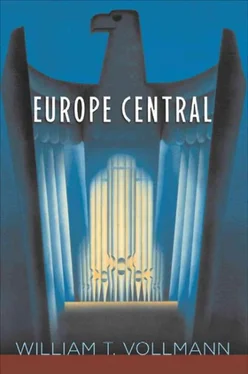3
Elena would most certainly have been there, gazing up through the flags and streamers, when the AHT-20 “Maxim Gorki” plane flew overhead in 1935, but that was when we locked her away. I remember when we arrested her; I was there, and she stood before us with her eyes half-closed like the blacked-out headlights of a tramcar in wartime; that was when I knew that this was her “intimate look,” that Shostakovich and Vera and Lina and those other boys and girls alike in love with her, always throwing rockets, they’d all seen this; this made me crazy; it was right then that I fell in love with her; I became another of her victims.
Squares of Red Army men marched along the base of a wall of airplanes whose propellers had all been oriented perfectly parallel to the ground, but Elena wasn’t there; she was with us.
I repeat: What did Elena really look like? Not like a Rodchenko angel at all, not any more than she resembled the KPIR-3 glider of 1925: wings like squared-off banana fronds, a skeletal body of hollow triangles. In her own interest, I freely confess to altering certain details of her appearance throughout this book. For instance, Elena Konstantinovskaya was blonde, and it was as a blonde that Shostakovich, the protagonist of these stories, would certainly have thought of her, but to me, and what I say goes, she will always be the darkhaired woman, or, if you prefer, the woman with the dark, dark hair.
4
In 1930, People’s Commissar Voroshilov was present at the maiden voyage of the TB-5 bomber, but Elena was too young. (Her Komsomol report for that year reports her as being extremely proficient in sharpshooting and first aid—two skills which would serve her well in Spain.) How happy she would have been to watch the takeoff of the TB-5! I’ll write her in if I care to; I’ll give her a front row spot in front of what they still liked to call the cosmodrome. Can’t I be allowed my amusements? After all, the great aviator V. Chkalov was grounded for prankishly flying under a bridge in Leningrad.
In proof of my deservingness, let me remind you that I never touched Elena Konstantinovskaya. I never even introduced myself, not even when I arrested her.—Vera Ivanova was another matter.—So it’s not from personal experience but from personal observation that I can so accurately describe the way that Elena could be so distant and angry with those who loved her, so sweet to win back those who were slipping away. I didn’t lean on Roman Karmen, nor even on that bastard Shostakovich until Elena had definitively moved on. From 1953 on I resisted checking up on her more than once a week, no matter how tempted I felt. (I remember on one winter morning in Leningrad watching her flicker between each of the eight white columns, formerly yellow, of the Smolny Institute.) When she died in 1975, I respectfully refrained from attending her funeral. Establishing that code of behavior for myself didn’t require me to own a degree in rocket science (an endeavor of great importance to our Soviet land, and accordingly always supported by Marshal M. N. Tukhachevsky). As a matter of fact, most rocket scientists end up being traitors. I wish it weren’t that way. But since it is, why not imagine that there’s one loyal rocket scientist? And who would that be but Elena Konstantinovskaya, who is pure and perfect and good? Shall I make her an astrophysicist right now? Don’t tell me I don’t have the nerve! Why, if I felt like it, I could anoint her with those crimson rhomboids which we find exclusively on the shoulders of our Red Army commanders!
B. N. Yuriev was the very first to construct a rigid theoretical proof that helicopter flight was possible. What could you do to me if I corrected history so that the name of that theoretician became E. E. Konstantinovskaya? At the very least, can’t I place her within one of those blue and green Soviet biplanes which used to be all the time buzzing in the slipstream above our heads?
I know everything, I really do. I could tell you precisely which two of Akhmatova’s lines it was that Vera Ivanova murmured in Elena’s ear on that last day by the riverbank when she understood that it was truly over between her and Elena. I’ve read Elena’s diary (which is now in our archive) and I’m more aware than she ever was, thanks not only to the gift of distance but also to my own professional training, why she dreamed what she did the night after she first met Shostakovich. These temptations I’m likewise proof against; surely you’re not interested in biochemical accidents of personality. But another of her dreams I’ll report to you, because it was a dream that all of us had in those years, thanks to the deteriorating international situation, which resulted inevitably from the struggle between capitalists to devour the hugest profits. Over and over, Elena Konstantinovskaya woke up sweating from a dream she hated almost as much as her dream of the black telephone; she dreamed of a long finned bomb slowly flying through darkness above a glowing pyramid. ‣
MAIDEN VOYAGE

What child is there that lives, as I did, midway between Reality and Fairy-land, that does not long sometimes to leave altogether the familiar world and set off in search of new and fabulous realms?
—Hanna Reitsch, German pilot, ca. 1947
1
The telephone rang. Then it was agreed: Krakow to us, Lwow to them, Warsaw to us, Brest-Litovsk to them. That was how we established the Ribbentrop-Molotov Line.—Not another inch! the sleepwalker shouted into the heavy black mouthpiece, but that obedient buzz of assent might have concealed something. He longed to smash open the telephone’s bakelite shell and peer within, but dreaded what he might find. Never mind; he’d win with commands and arguments.
He told the telephone: Get somebody over here with the order of battle.
Trudl, he said to his favorite secretary, would you be so good as to bring me that white Barbarossa folder? Thank you, child.
He instructed the telephone: That makes absolutely no difference. Over there they’ve got nothing but low-quality Slavic formations.
Then it was time to confirm with Göring that our rocket-planes were ready.
As a matter of fact, we weren’t even supposed to have tanks. Even armored scout cars had been forbidden us by the Anglo-American plutocrats. Well, what about rockets? Our enemies had overlooked those. I myself was already a fervent rocket man and had been ever since the Rhön Gliding Contests of 1933. How else were we going to get the Polish Corridor back?
If we could only go to the moon! sighed Herr Doktor von Braun.—I met him once—a certified genuis. He died in America, long after the war. Imagine! He’d sold himself to the victors, just so somebody could get to the moon.
But in the sleepwalker’s time, our moon-wooers were flying inside of bombs powered by intermittent propulsive duct engines.
You probably don’t even remember your first rocket, for the same reason that I forget my first telephone. The first rocket I ever saw was a long grey-green monster with a helmeted, goggled man in the cockpit, black crosses on each wing, screaming engines and fat little bombs, not to mention a pair of machine-guns on the upper deck. You wouldn’t call it a rocket at all; you live in the future, when the Americans stand on the verge of conquering Saturn. That first rocket was actually nothing but a fighter with a rocket engine, its bomblets only for show. Doktor von Braun hadn’t started working on our V-weapons; the Russians hadn’t yet stolen a march on us with Sputnik. Still, why not call it a rocket? By the way, it happened to be equipped with a quintuplicator to record five pieces of aerial data; that I can swear to, because I invented the quintuplicator myself! Oh, yes, I was there; I was there at the very beginning; even before the Heinkel-Hirth turbojet experiments. I’d always wanted to visit the moon myself, you see.
Читать дальше













